Earthquake in Haiti
• Support and Defend the Haitian People! No to Use of Military Force!
• Massive U.S. Military Response to Haiti
• Grant Temporary Protected Status for Haitian Refugees
• Systemic Roots to Disasters in Haiti and New Orleans
• Ten Things the U.S. Can and Should Do for Haiti • Give Billions in Bankers’ Bonus Money to Haiti
• Immediate Internationalist Assistance from Cuba, Venezuela and Other Countries from Latin America and the Caribbean
• U.S. Media Refuse to Report Cuba’s Contributions in Haiti • The Lesson of Haiti
Support and Defend the Haitian People!
No to Use of Military Force!
Our hearts and support go out to all the people of Haiti and the diaspora in the U.S. and worldwide for the loss of life and destruction taking place in the wake of the earthquake that struck the country January 12. Everywhere people are deeply saddened by the horrific situation, where an estimated 3 million people are without shelter and most without food and water. Across the U.S. people are organizing to collectively pool their concerns and resources in an effort to assist the Haitians. Numerous medical teams from fire departments have volunteered to go to Haiti to provide the much needed medical relief. But, as occurred with the government-organized disaster after Hurricane Katrina in New Orleans, they are being told to wait.
There is great concern that the aid needed is not being delivered. The U.S., as one of the closest and wealthiest countries is in a position to rapidly provide assistance. Reports from Haitian activists on the ground have emphasized that the support most urgently needed now is medical teams; heavy equipment and specialists to clear roads and debris; more helicopters and smaller boats to ferry people and supplies; and shelter for the millions without it. The U.S. has the capacity to rapidly provide equipment and transport and set up whole cities within days, as they do for military occupations. Why is this not being done now to provide shelter and field hospitals? Instead helicopters and coast guard cutters are being used mainly to transport troops.
We vigorously reject this military response and demand that all efforts be directed to emergency and medical relief. We denounce U.S. actions that have blocked or delayed civilian aid planes from landing at the airport, controlled by the U.S., while giving priority to troops.
Government spokespeople have said the estimated 5,500 troops being sent are armed and will primarily be used for “security” purposes. President Barack Obama, in addressing the crisis said, “Responding to a disaster of this magnitude will require every element of our national capacity – our diplomacy and development assistance; the power of our military; and, most importantly, the compassion of our country.” What is meant by the “power of our military” in a situation where health needs, recovery and reconstruction are at stake? The 82nd Airborne were the first troops on the ground in Haiti. The 82nd were also the ones sent to New Orleans. No one has forgotten that troops in New Orleans were given “shoot to kill” orders and did kill Katrina survivors, in the name of “restoring order” and “stopping looters.” Voice of Revolution rejects the U.S. response of use of military force and imposing yet another occupation in the name of “security.” We also reject the chauvinism of the military forces in charge, who have refused to allow rescue and medical forces into Port au Prince, claiming the military has to “secure” the area first. The U.S. chauvinism that says the lives of rescue workers are more valuable than those of the Haitians is rotten to the core. The rescue workers themselves are demanding to go as they are prepared for and trained to contend with emergency conditions and know very well that every minute counts.
In Haiti there is every sign that the troops will be used against the people and for further securing U.S. monopoly interests. News headlines January 13 emphasized the “massive U.S. military response.” These were followed, almost as an afterthought, by headlines about “relief being sent.” And now the emphasis is “chaos” and “threats of looting” supposedly blocking delivery of aid.
U.S. actions demonstrate, as they did in New Orleans, that the aim is not providing aid — it is military occupation. It is urgent that all those concerned about Haiti stand firmly against any use of military force against the Haitians. All the U.S. military forces should be disarmed and priority given to relief efforts. And U.S. troops must be removed as rapidly as possible.
U.S. Imperialism Cause of Poverty in Haiti
It is also the case that the severity of conditions in Haiti is not the result of the earthquake but rather the long history of U.S. occupation and repression. Obama and Secretary of State Hillary Clinton have both tried to hide this reality, saying the situation is “incomprehensible,” and “it is Biblical, the tragedy that continues to daunt Haiti.” U.S. imperialism has guaranteed that Haiti has remained one of the poorest countries in the world. From the days when Haitians rose up and eliminated slavery — while slavery still existed in the U.S. — the imperialists have never forgiven the Haitian people. They imposed ruthless dictators, like the Duvaliers. More recently the U.S. was behind the coup in Haiti in 2004 that ousted democratically elected President Jean-Bertrand Aristide, with U.S. marines forcing him at gunpoint to board a plane out of the country. Aristide, and many Haitians, are today demanding he be allowed to return. The U.S. is refusing.
The U.S.-dominated financial institutions, like the World Bank and International Monetary Fund (IMF) have repeatedly interfered, imposing programs that wrecked Haitian agriculture and forced hundreds of thousands off the land and into the cities. The U.S. and France, the colonizer before the U.S., have both refused to pay reparations for the crimes and devastation that both imposed on Haiti. It is not an “act of God” that has brought devastation but imperialism and its exploitation and slavery. And the wretched conditions and absence of civilian infrastructure now being revealed despite decades of so-called aid and dictate by the U.S. reveals that it is imperialism that is unsustainable and the source of poverty in Haiti.
It is also of concern that while President Obama spoke of military power he also said the U.S. response requires “most importantly, the compassion of the nation.” There is little doubt that deep compassion is felt across the country and the drive to assist the people of Haiti is strong. By playing on these sentiments of solidarity, charity is to replace the government in terms of providing the level and quantity of aid needed and demanded. It is to let the government off the hook and promote the conception that society, represented by government, is not responsible for meeting the needs of those most vulnerable, but rather individuals are. We demand that assistance must come first and foremost from the government.
As well, the U.S. has a long history of using private charities, non-governmental organizations and those like the Red Cross to interfere in other countries and fund activities against the interests of the people. Katrina survivors and local Red Cross volunteers know well the treachery of the top officials that meant donations secured for Katrina survivors did not reach them.
It is vital to remain vigilant against calls for “humanitarian aid,” which serve to justify further militarization of Haiti and the region. The U.S. is planning to send several battleships to the area along with the 5,500 troops. Obama has emphasized that the U.S. will be with Haiti for “the long hall.” Given Haiti’s location right next to Cuba and positioned near Venezuela, battleships and troops in the region coupled with the increased military bases in Colombia are of grave concern for all the peoples of the region. This is not aid. It is the crime against peace of preparing more aggression.
Haitians do not need to be reoccupied and colonized. They do not need more troops in their country serving to protect the wealthy and repress the people. And most certainly they do not need to be labeled as “looters” in their own country while those who have actually looted and raped the country for decades, the U.S. first and foremost, are presented as saviors.
The people of Haiti are known throughout the world as the first to eliminate slavery. In 1804 they established Haiti as the first nation whose constitution enshrined rights on a modern basis that they belong to people by virtue of their being human. They abolished slavery at a time when slavery was still rampant in the U.S. and for that victory the U.S. rulers have never forgiven the Haitians. They have unleashed their brutal repression and kept the country impoverished as payback for the shining example of the Haitians to the oppressed peoples of the world. And as a means to continue exploiting Haitian land and labor. Consequently, for two hundred years, instead of the Haitian people being permitted to chart their own course as an independent nation and humanize their social and natural environments they have been undermined by all manner of political, economic and military interventions carried out by foreign powers, with the U.S. at the head.
The Haitian people have repeatedly shown their resilience and determination to march on undaunted despite this brutal repression. It is this spirit, uncrushed by the earthquake that the U.S. will now again attempt to crush using the banner of “humanitarian aid.” We say No!
Stand with the Haitian People!
No to Use of Military Force and Further Occupation Of Haiti
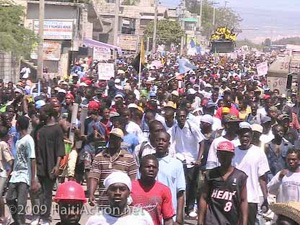
![]()
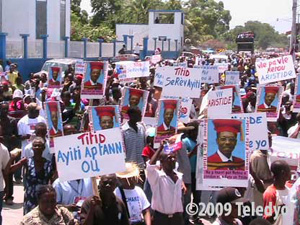
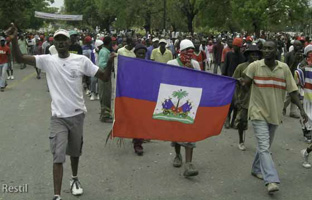
![]()
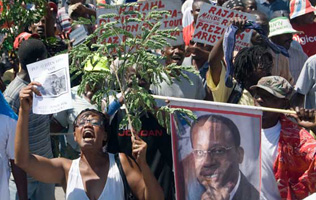
2009 saw many actions by Haitians demanding their rights, including fighting for democratic elections and the return of President Aristide, ousted in a U.S.-organized coup in 2004.
[TOP]
Massive U.S. Military Response to Haiti
The U.S. is organizing a massive military response to the situation in Haiti. Far from guaranteeing that the medical, heavy equipment and transport needs of the Haitian people are met as rapidly as possible, the U.S. is emphasizing transport of troops. An armada of Navy ships, helicopters, transport planes and at least 5,500 troops are being sent. One of the U.S. Navy’s large amphibious ships was sent to Haiti with the 2,000 Marine expeditionary unit aboard, according to General Douglas Fraser, head of U.S. Southern Command. Fraser said other U.S. military forces are on alert, including a brigade, which includes about 3,500 troops. He added that the Pentagon is “seriously looking at” sending thousands more Marines in addition to these 5500 troops. The troops are generally not specialized forces, such as medical personnel, which is most needed. Rather, as Fraser added, they will mainly act to “enforce law and order.” The 82nd Airborne, known for its repression in New Orleans, were the first to arrive on the ground.
The general said that a U.S. aircraft carrier, the USS Carl Vinson was to arrive January 15. The USS Bataan, carrying Marines from the 22nd Marine Expeditionary Unit, USS Fort McHenry and USS Carter Hall were ordered to get under way as well and more vessels were ordered to stand by. The USS Higgins from Naval Station San Diego was sent to provide logistical services for Coast Guard helicopters. The Navy’s hospital ship, however, is not expected to arrive for at least another week.
Fraser’s Miami-based Southern Command also dispatched a team of 30 people to Haiti to “assess” the situation on the ground and determine what military forces and other aid is needed. Officials said two C-130 aircraft departed January 13 for Haiti with the team of military engineers, operational planners, communications specialists and a command and control group. The Air Force is sending people to provide air traffic control and operations at the Port-au-Prince airport.
Already, with U.S. takeover of the airport, priority has been given to the military, while a number of civilian relief planes have not been permitted to land, delayed or rerouted to the Dominican Republican, delaying supplies by 24 hours.
There are fewer than 300 U.S. civilian relief workers arriving in Haiti.
In the present situation, the Haitians need immediate and unconditional assistance to rescue trapped survivors, provide medical assistance and ensure that epidemics of disease do not break out. A massive military response emphasizing occupation troops does not serve that purpose.
[TOP]
Grant Temporary Protected Status
for Haitian Refugees
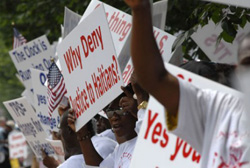 U.S. immigrant and refugee rights organizations in the U.S. are calling on President Barack Obama to take action regarding the situation of Haitian refugees in the U.S.
U.S. immigrant and refugee rights organizations in the U.S. are calling on President Barack Obama to take action regarding the situation of Haitian refugees in the U.S.
The National Network for Immigrant and Refugee rights in a recent statement points out: “Thousands of Haitians living in the U.S., many for long periods of time, currently face deportation or languish in detention because the U.S. government has refused to heed the call from activists, community members and allies across the country urging for the Administration to grant Temporary Protected Status (TPS) to Haitian nationals in the U.S.
“The TPS program provides temporary status for foreign nationals residing in the U.S. and whose homeland conditions are recognized by the US government as being temporarily unsafe or overly dangerous for a return to (e.g., war, earthquakes, flood, drought, or other extraordinary and temporary conditions). Even after the grave impact of four hurricanes in 2008, the Administration has resisted the calls for TPS for Haitians. “NNIRR invites you to join us in urging the Obama Administration to immediately grant Temporary Protected Status (TPS) for Haitians in the U.S.
“Immigration and Customs Enforcement recently announced a temporary suspension of deportations to Haiti in light of these tragic events. However, thousands of Haitians will remain in detention indefinitely, away from their families and without any recourse for release, and other Haitians without legal immigration status will continue to be subject to arrest and detention. Many in immigrant detention continue to face inhumane conditions and pervasive abuses that have led to over 100 deaths, as recently revealed by the New York Times. Tell President Obama to release Haitian nationals in immigration detention, especially those with U.S. families who do not pose a risk to public safety.”
The TransAfrica Forum in a recent statement points out: “Since January 2009 U.S. immigration judges have issued deportation orders to over 30,000 undocumented Haitians.” In addition to calling on the Department of Homeland Security to immediately halt the arrests of these deportees and grant them TPS, it also calls on that body to “conduct a full review of its policy towards Haiti. Temporary protected status (TPS) is granted by the United States (Homeland Security Department) to eligible nationals of countries that cannot safely return to their homelands because of armed conflict, environmental disaster, or other extraordinary and temporary conditions. Haiti clearly fit s this description.”
[TOP]
Systemic Roots to Disasters
in Haiti and New Orleans
The crisis in Haiti is systemic in its roots.
Disasters are acts of nature. But as we saw in New Orleans, systems of poverty and exploitation interact and intersect with natural events to create massive loss of life. This is why, when the same hurricanes hit Cuba and Haiti, hundreds die in Haiti while almost no one dies in Cuba. Cuba, a very poor nation suffering from decades of economic warfare from the US, has a better survival rate from hurricanes than Florida or the rest of the US. When Hurricane George hit Haiti, the Dominican Republic and Cuba, 100 died in Haiti, 200 in the Dominican Republic, and six in Cuba.
In New Orleans, we’ve seen literally tens of billions of dollars in aid pledged in the years since Katrina, but only a small fraction of that has made it to those most in need. More than 60,000 residential addresses - a third of our city - remain empty or abandoned. At least twelve thousand people in our city - nearly five percent of our population - faced these recent cold weeks with no roof over their heads.
In Haiti, mining and other corporate exploitation made the land more unsafe. Two hundred years of crippling debt imposed by France, the U.S. and other colonial powers drained the country’s financial resources. Military occupation and presidential coups coordinated and funded by the US have devastated the nation’s government infrastructure.
Please remember the U.S. role in this tragedy. As Haiti’s democratically elected president is exiled in South Africa without a passport, remember that it was U.S. forces that came in and removed him from power. As U.S. Congressman Rangel told CNN at the time, “He was kidnapped [by U.S. soldiers]. He and his wife had no idea where he was going. He was very apprehensive for his life.”
Journalist and author Naomi Klein reported that within 24 hours of the earthquake, the influential right-wing think tank the Heritage Foundation was already seeking to use the disaster as an attempt at further privatize Haiti's economy.
Haitian poet and human rights lawyer Ezili Dantò has written, “Haiti’s poverty began with a U.S./Euro trade embargo after its independence, continued with the Independence Debt to France and ecclesiastical and financial colonialism. Moreover, in more recent times, the uses of U.S. foreign aid, as administered through USAID in Haiti, basically serves to fuel conflicts and covertly promote U.S. corporate interests to the detriment of democracy and Haitian health, liberty, sovereignty, social justice and political freedoms. USAID projects have been at the frontlines of orchestrating undemocratic behavior, bringing underdevelopment, coup d’etat, impunity of the Haitian Oligarchy, indefinite incarceration of dissenters, and destroying Haiti’s food sovereignty essentially promoting famine.”
Also remember that not all aid is equal. Tracy Kidder, of the Haiti-based organization Partners in Health, said it very well: “There are 10,000 aid organizations in Haiti, and Haiti is still one of the poorest countries in the world — something is wrong with the way things are, the way aid is being administered.” Major organizations like the Red Cross spend most of their money on salaries for people who are not from Haiti, and very little of your donation makes it to the people who need it the most. And because their mission is to focus only on emergencies, they will do nothing to address the systemic problems that caused this massive loss of life.
The other lesson from New Orleans is this: Haiti will still be in crisis long after all of the news cameras have left. As concerned family and friends of Haiti, we need to make sure that we stay involved.
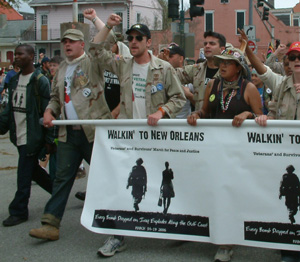
![]()
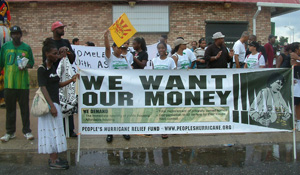
Actions defending rights in New Orleans after the government-made Katrina disaster, including demand that money collected by charities for survivors be given to Katrina survivors. With 10,000 aid organizations in Haiti and numerous charities collecting funds, defenders of Haiti are also demanding that money for Haitian survivors be given to them.
[TOP]
Ten Things the U.S. Can and Should Do for Haiti
One. Allow all Haitians in the U.S. to work. The number one source of money for people in Haiti is the money sent from family and workers in the U.S. back home. Haitians in the U.S. will continue to help when the world community moves on to other problems.
Two. Do not allow U.S. military in Haiti to point their guns at Haitians. Hungry Haitians are not the enemy. Decisions have already been made which will militarize the humanitarian relief – but do not allow the victims to be cast as criminals. Do not demonize the people.
Three. Give Haiti grants as help, not loans. Haiti does not need any more debt. Make sure that the relief given helps Haiti rebuild its public sector so the country can provide its own citizens with basic public services.
Four. Prioritize humanitarian aid to help women, children and the elderly. They are always moved to the back of the line. If they are moved to the back of the line, start at the back.
Five. President Obama can enact Temporary Protected Status for Haitians with the stroke of a pen. Do it. The US has already done it for El Salvador, Honduras, Nicaragua, Sudan and Somalia. President Obama should do it on Martin Luther King Day.
Six. Respect Human Rights from Day One. The UN has enacted Guiding Principles for Internally Displaced People. Make them required reading for every official and non-governmental person and organization. Non-governmental organizations like charities and international aid groups are extremely powerful in Haiti – they too must respect the human dignity and human rights of all people.
Seven. Apologize to the Haitian people everywhere for Pat Robertson and Rush Limbaugh
Eight. Release all Haitians in US jails who are not accused of any crimes. Thirty thousand people are facing deportations. No one will be deported to Haiti for years to come. Release them on Martin Luther King Day.
Nine. Require that all the non-governmental organizations, which raise money in the U.S., be transparent about what they raise, where the money goes, and insist that they be legally accountable to the people of Haiti.
Ten. Treat all Haitians as we ourselves would want to be treated.
Bill Quigley is Legal Director at the Center for Constitutional Rights and a law professor at Loyola University, New Orleans. He is a Katrina survivor and has been active in human rights in Haiti for years with the Institute for Justice and Democracy in Haiti.
[TOP]
Protest on Wall St. Friday, January 15
Give Billions in Bankers’ Bonus Money to Haiti
Organizers of the January 15 March on Wall Street report that the Friday protest will also be a solidarity event with the Haitian people. The protest is opposing government bailouts of the financial monopolies and demanding that governments at all levels fund social programs and provide funding for those facing unemployment and foreclosures. The protest is scheduled for Friday, January 15, at Wall St. and Broad St. from 3:30 to 6:00 p.m., in New York City.
Organizers report that focusing on Haiti broadens the scope of the action. "Just as the banks in their insatiable quest for super profits ravish communities and poor and working people in every region of the U.S., they plunder all the more poor countries like Haiti. The Wall St. protest will demand a real jobs program for the unemployed and underemployed here in NYC. We are demanding reparations for Haiti. The $18 billion in bonuses that Goldman Sachs plans to pay its top bankers is more than 50 percent of Haiti’s GDP. We demand that the big banks give all of the money that they set aside for bonuses to the people of Haiti.”
Friday’s protest will also speak to the urgent need for the U.S. Government to:
• Release all Haitian Immigrants being held in detention
• Give work permits to all Haitians who need them
• End the deportation of Haitians
• Allow entry into the U.S. to all of the Haitian refugees who are fleeing the catastrophe
[TOP]
Immediate Internationalist Assistance from Cuba, Venezuela and Other Countries
from Latin America and the Caribbean
On Wednesday morning, Cuban Foreign Minister Bruno Rodríguez Parrilla gave a detailed explanation of the situation of Cuban cooperation workers in Haiti after Tuesday’s earthquake. He clarified that there are currently “403 Cuban cooperative personnel, 334 of whom are working in the heath sector as doctors and paramedics,” in the devastated country. The building housing the Cubans in Port au Prince, the Anexo, survived the quake and served to provide first aid to the victims in the first hours after the quake.
Hundreds of people with different types of injuries were treated by barely a dozen Cuban doctors who were in the facility when the 7.0-degree earthquake struck the country. Immediately afterwards, other Cuban doctors, paramedics and nurses — members of the medical mission working in other areas of the country — were called in for back up.
From Cuba, a group of health experts from the Henry Reeve Contingent for Emergency situations and others who were on vacation back in Cuba from international missions were sent to Haiti on Wednesday. Without delay, they set up to work in the Anexo and in two other facilities that were fitted out as field hospitals next to the destroyed Cathedral and in the center of the city.
The minister added that plans are underway for Cuba to provide further assistance to its fellow Caribbean nation, consisting of “a quantity of medicine and heath materials. An additional number of doctors are to travel there.”
“Our ambassador and other compañeros working in Port-au-Prince spent the entire night and early morning touring the city to contact our compatriots there because communication lines have collapsed.” Similarly, “the team from the Ministry of Foreign Affairs is working tirelessly to coordinate the response from all of our institutions.”
The Cuban foreign affairs minister reiterated Cuba’s disposition to participate in any CARICOM effort. “In this context we are in contact with the CARICOM mission and we will certainly work together there to provide assistance to the Haitian people.”
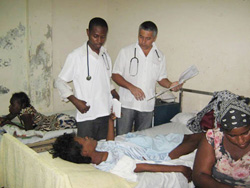 While U.S. media have been reporting that surgery and other medical necessities cannot be done because there is no electricity, the Cubans have shown that it can be done despite the difficult conditions. In just the first few days quality medical care, including surgeries, is being provided twenty-four hours a day, 600-700 people being treated daily. In addiiton the more than 500 Haitian doctors trained in Cuba since 1999 are working to provide relief. (Haitian doctor trained in Cuba and Cuban doctor in Haiti, pictured in photo.)
While U.S. media have been reporting that surgery and other medical necessities cannot be done because there is no electricity, the Cubans have shown that it can be done despite the difficult conditions. In just the first few days quality medical care, including surgeries, is being provided twenty-four hours a day, 600-700 people being treated daily. In addiiton the more than 500 Haitian doctors trained in Cuba since 1999 are working to provide relief. (Haitian doctor trained in Cuba and Cuban doctor in Haiti, pictured in photo.)
Mexico is sending a team of doctors and rescue workers. Nicaraguan President Daniel Ortega sent a team of electricians to help with the repair of power lines as much of the country’s electricity and telecommunications systems were destroyed in the quake.
Venezuela’s first aid airplane to Haiti, a Bolivarian National Armed Force’s Hercules C-130, with a fifty-strong advance humanitarian aid team on board, arrived Wednesday morning. Venezuelan President Hugo Chavez ordered the immediate deployment of the aid team on Tuesday comprised of doctors, engineers, search and rescue specialists, and civil protection officers, as well as urgently needed food, water, medical supplies, and rescue equipment. Chavez said Venezuela would send further aid and supplies.
Brazil also announced its intention to assist those affected. In a statement issued Wednesday, Brazil’s defense minister, Nelson Jobim, urged his country’s military stationed in Haiti to “make every possible effort” to reduce the suffering of the population. However it is unclear what the character of this assistance will be given that Brazil heads the UN mission in Haiti (MINUSTAH) which is used as an instrument to violently suppress the Haitian people.
Argentina, Bolivia, Brazil, Chile, Colombia, Ecuador, El Salvador, Guatemala, Paraguay, Peru, and Uruguay are among the countries contributing military or police forces to relief efforts, Venezuelanalysis.com reports.
Among those countries that distinguished themselves by being amongst the first to have response teams on the ground was China. Meanwhile, more and more rescue and aid teams from around the world are arriving to provide assistance.
[TOP]
Hundreds of Cuban Doctors Providing Medical Care
U.S. Media Refuse to Report
Cuba’s Contributions in Haiti
There are only two U.S. media outlets that have reported on Cuba’s response to the deadly 7.0 earthquake that hit Haiti. One was Fox News, which claimed, wrongly, that the Cubans were absent from the list of neighboring Caribbean countries providing aid. The other was the Christian Science Monitor (a respected news organization that recently shut down its print edition), which reported correctly that Cuba had dispatched 30 doctors to the stricken nation.
The Christian Science Monitor, in a second article, quoted Laurence Korb, former assistant secretary of defense and now based at the Center for American Progress, as saying that the U.S., which is leading the relief efforts in Haiti, should “consider tapping the expertise of neighboring Cuba,” which he noted, “has some of the best doctors in the world — we should see about flying them in.”
As for the rest of the U.S. media, they have simply ignored Cuba’s role and actions. In fact, left unmentioned is the reality that Cuba already had over 400 doctors posted to Haiti to help with the day-to-day health needs of this nation in the Americas, and that those doctors were the first to respond to the disaster, setting up a hospital right next to the main hospital in Port-au-Prince which collapsed in the earthquake.
Far from “doing nothing” about the disaster as the right-wing propagandists at Fox-TV were claiming, Cuba has been one of the most effective and critical responders to the crisis, because it had set up a medical infrastructure before the quake, which was able to mobilize quickly and start treating the victims.
The American emergency response, predictably, has focused primarily, at least in terms of personnel and money, on sending the hugely costly and inefficient US military — a fleet of aircraft and an aircraft carrier — a factor that should be considered when examining that $100 million figure the Obama administration claims is being allocated to emergency aid to Haiti.
Considering that the cost of operating an aircraft carrier, including crew, is roughly $2 million a day, just sending a carrier to Port-au-Prince for two weeks accounts for a quarter of the announced American aid effort, and while many of the military personnel sent there will certainly be doing actual aid work, delivering supplies and guarding supplies, many, given America’s long history of brutal military/colonial control of Haiti, will inevitably be spending their time ensuring continued survival and control of the parasitic pro-U.S. political elite in Haiti.
Otherwise, the U.S. has basically ignored the ongoing day-to-day human crisis in Haiti, while Cuba has been doing the yeoman work of providing basic health care. But that is not a story that the American corporate media want to tell.
Dave Lindorff is a Philadelphia-based journalist and columnist. His work is available at www.thiscantbehappening.net
[TOP]
Two days ago, at almost six o’clock in the evening Cuban time and when, given its geographical location, night had already fallen in Haiti, television stations began to broadcast the news that a violent earthquake – measuring 7.3 on the Richter scale – had severely struck Port-au-Prince. The seismic phenomenon originated from a tectonic fault located in the sea just 15 kilometers from the Haitian capital, a city where 80 percent of the population inhabits fragile homes built of adobe and mud.
The news continued almost without interruption for hours. There was no footage, but it was confirmed that many public buildings, hospitals, schools and more solidly constructed facilities were reported collapsed. I have read that an earthquake of the magnitude of 7.3 is equivalent to the energy released by an explosion of 400,000 tons of TNT.
Tragic descriptions were transmitted. Wounded people in the streets were crying out for medical help, surrounded by ruins under which their relatives were buried. No one, however, was able to broadcast a single image for several hours.
The news took all of us by surprise. Many of us have frequently heard about hurricanes and severe flooding in Haiti, but were not aware of the fact that this neighboring country ran the risk of a massive earthquake. It has come to light on this occasion that 200 years ago, a massive earthquake similarly affected this city, which would have been the home of just a few thousand inhabitants at that time.
At midnight, there was still no mention of an approximate figure in terms of victims. High-ranking United Nations officials and several heads of government discussed the moving events and announced that they would send emergency brigades to help. Given that MINUSTAH (United Stabilization Mission in Haiti) troops are deployed there – UN forces from various countries – some defense ministers were talking about possible casualties among their personnel.
It was only yesterday, Wednesday morning, when the sad news began to arrive of enormous human losses among the population, and even institutions such as the United Nations mentioned that some of their buildings in that country had collapsed, a word that does not say anything in itself but could mean a lot.
For hours, increasingly more traumatic news continued to arrive about the situation in this sister nation. Figures related to the number of fatal victims were discussed, which fluctuated, according to various versions, between 30,000 and 100,000. The images are devastating; it is evident that the catastrophic event has been given widespread coverage around the world, and many governments, sincerely moved by the disaster, are making efforts to cooperate according to their resources.
The tragedy has genuinely moved a significant number of people, particularly those in which that quality is innate. But perhaps very few of them have stopped to consider why Haiti is such a poor country. Why does almost 50 percent of its population depend on family remittances sent from abroad? Why not analyze the realities that led Haiti to its current situation and this enormous suffering as well?
The most curious aspect of this story is that no one has said a single word to recall the fact that Haiti was the first country in which 400,000 Africans, enslaved and trafficked by Europeans, rose up against 30,000 white slave masters on the sugar and coffee plantations, thus undertaking the first great social revolution in our hemisphere. Pages of insurmountable glory were written there. Napoleon’s most eminent general was defeated there. Haiti is the net product of colonialism and imperialism, of more than one century of the employment of its human resources in the toughest forms of work, of military interventions and the extraction of its natural resources.
This historic oversight would not be so serious if it were not for the real fact that Haiti constitutes the disgrace of our era, in a world where the exploitation and pillage of the vast majority of the planet’s inhabitants prevails. Billions of people in Latin American, Africa and Asia are suffering similar shortages although perhaps not to such a degree as in the case of Haiti.
Situations like that of that country should not exist in any part of the planet, where tens of thousands of cities and towns abound in similar or worse conditions, by virtue of an unjust international economic and political order imposed on the world. The world population is not only threatened by natural disasters such as that of Haiti, which is a just a pallid shadow of what could take place in the planet as a result of climate change, which really was the object of ridicule, derision, and deception in Copenhagen.
It is only just to say to all the countries and institutions that have lost citizens or personnel because of the natural disaster in Haiti: we do not doubt that in this case, the greatest effort will be made to save human lives and alleviate the pain of this long-suffering people. We cannot blame them for the natural phenomenon that has taken place there, even if we do not agree with the policy adopted with Haiti.
But I have to express the opinion that it is now time to look for real and lasting solutions for that sister nation.
In the field of healthcare and other areas, Cuba – despite being a poor and blockaded country – has been cooperating with the Haitian people for many years. Around 400 doctors and healthcare experts are offering their services free of charge to the Haitian people. Our doctors are working every day in 227 of the country’s 337 communes. On the other hand, at least 400 young Haitians have trained as doctors in our homeland. They will now work with the reinforcement brigade, which traveled there yesterday to save lives in this critical situation. Thus, without any special effort being made, up to 1,000 doctors and healthcare experts can be mobilized, almost all of whom are already there willing to cooperate with any other state that wishes to save the lives of the Haitian people and rehabilitate the injured. Another significant number of young Haitians are currently studying medicine in Cuba.
We are also cooperating with the Haitian people in other areas within our reach. However, there can be no other form of cooperation worthy of being described as such than fighting in the field of ideas and political action in order to put an end to the limitless tragedy suffered by a large number of nations such as Haiti.
The head of our medical brigade reported: “The situation is difficult, but we have already started saving lives.” He made that statement in a succinct message hours after his arrival yesterday in Port-au-Prince with additional medical reinforcements.
Later that night, he reported that Cuban doctors and ELAM’s [the Latin American School of Medicine] Haitian graduates were being deployed throughout the country. They had already seen more than 1,000 patients in Port-au-Prince, immediately establishing and putting into operation a hospital that had not collapsed and using field hospitals where necessary. They were preparing to swiftly set up other centers for emergency care.
We feel a wholesome pride for the cooperation that, in these tragic instances, Cuba doctors and young Haitian doctors who trained in Cuba are offering our brothers and sisters in Haiti!
